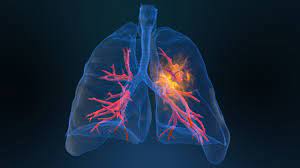Life and Breath – Outliving Lung Cancer

Life and Breath – Outliving Lung Cancer
- onco
- May 13, 2022
Keep yourself confident and fight all the odds, no matter whether it’s life threatening disease or any harsh situation. Coming to the point, our lungs are two pliable organs in our chest that allow us to breathe in oxygen and exhaust carbon dioxide.
The largest cause of cancer-related fatalities globally is lung cancer.
Lung cancer can affect persons who have never smoked, although smokers are at a higher risk than nonsmokers. The quantity and frequency of cigarettes you’ve smoked are related to your chance of developing lung cancer. Even after years of smoking, quitting can greatly lower your risk of developing lung cancer.
Symptoms
In its early stages, lung cancer often exhibits no signs or symptoms. Lung cancer signs and symptoms often appear when the condition is advanced.
Lung cancer symptoms and signs may include:
- A chest infection that just started
- Spitting out blood, even a little bit of it
- Breathing difficulty
- Chest pain
- Hoarseness
- Dropping weight without trying
- A bone ache
- Headache
Types of lung cancer
Doctors classify the disease into two main categories based on how lung cancer cells look under a microscope. Depending on your primary form of lung cancer, your doctor will decide how to proceed with therapy.
The following are the two primary types of lung cancer:
- Small cell lung cancer:
Small cell lung cancer is less prevalent than non-small cell and nearly exclusively affects heavy smokers.
- Non-small cell lung cancer:
The phrase “non-small cell lung cancer” refers to various lung malignancies. Squamous cell carcinoma, adenocarcinoma, and large cell carcinoma are non-small cell lung malignancies.
Risk factors
Several variables may impact your chance of developing lung cancer. You may reduce certain risk factors, like smoking, by giving them up. Additionally, circumstances like your family history are beyond your control.
Lung cancer risk factors include:
- Smoking:
The number of cigarettes you smoke daily and the length of time you have smoked raise your chance of developing lung cancer. You may dramatically reduce your risk of lung cancer by quitting at any age.
- Exposure to passive smoking:
Even if you don’t smoke, being around secondhand smoke raises your chance of developing lung cancer.
- Radiation treatment that has come before:
You may be at a higher risk of developing lung cancer if you’ve had chest radiation therapy for another form of cancer.
- Exposure to other cancer-causing agents, such as asbestos
Your chance of developing lung cancer can arise if you work with asbestos and other cancer-causing agents, including arsenic, chromium, and nickel, especially if you smoke.
Prevention
Although there is no certain strategy to avoid lung cancer, you can lower your risk by:
- Avoid smoking:
Never start smoking if you haven’t already. Talk to your kids about quitting so they may learn how to avoid this significant lung cancer risk factor. Talk to your kids about the risks of smoking while they are young so they will be prepared to handle peer pressure.
- Increase your intake of fruits and vegetables.
Since they are the greatest way to get vitamins and minerals, high dosages of vitamin tablets should not be used since they may be harmful. For instance, researchers offered beta carotene supplements to heavy smokers to lower their risk of lung cancer. According to the findings, supplements raised smokers’ chance of developing cancer.
- Make an effort to exercise the majority of the time:
Start cautiously if you don’t routinely exercise.
When to consult a doctor
If you have any bothersome chronic indications or symptoms, schedule an appointment at the Delhi-based Oncoplus Hospital.
Make an appointment with our doctor if you smoke and have tried unsuccessfully to stop. Our physician can recommend methods to stop smoking, including counseling, drugs, and nicotine replacement aids.
Recent Posts
-
Can Testicular Cancer affect fertility?
April 23, 2025
-
Why are Breast Cancer Cases Increasing Around the World?
April 17, 2025





Leave a Reply